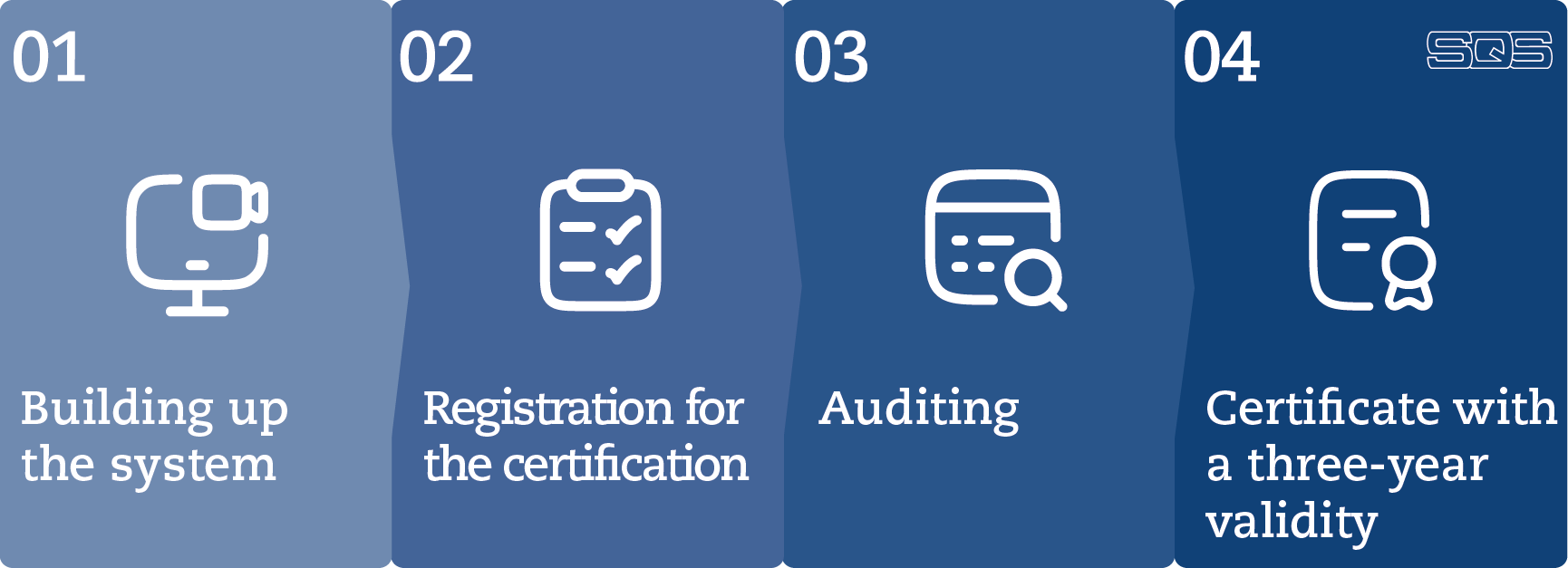ISO 22000:2018 – Certification of management systems throughout the food chain
Further development of the quality management system with the focus on food safety

Accreditation by the Swiss Accreditation Service (SAS)

Recognised internationally for access to markets worldwide

We have been certifying management systems since 1983

Around 7 000 customers trust our Services
Food management according to ISO 22000
The implementation of the specifications of standards (PRP, HACCP, traceability, recall/return, verification/validation, etc.) guarantee food safety requirements.
Target groups of ISO 22000
Harvesting and agricultural companies, manufacturers of food ingredients, food and feed, wholesale distributors, retailers, cafeterias, catering companies and service providers in the fields of cleaning, transport, storage and distribution, which require an internationally recognised certificate.
Validity period of the certificate
3 years - there is an annual audit to ensure that standards are being maintained and a recertification audit after 3 years.
Recognition of the SQS certificate
The SQS certificate of conformity with ISO 22000 has international validity and is recognised worldwide through the IQNET membership.
Responsible for the product and there for you

Lisa Thiele
Do you have any questions about the standard or our service? Would you like to know more about the certification process and the costs? Or may we provide you with a concrete offer for the certification?
We are happy to help you. Our account management team and I, as the product manager, will be happy to forward your questions to our experienced auditors. We want to make it as easy as possible for you to access certified management systems.
Please let us know how we can support you. We look forward to hearing from you!
Kind regards
Lisa Thiele
Food safety and risk prevention
An ISO 22000 certificate provides evidence that the company systematically addresses relevant food safety risks. This helps to reduce risks and serves as a confidence-building measure for customers, authorities and other stakeholders.
Recognition and market access
ISO 22000 is established worldwide and required by many trading partners and institutions. Especially in parts of the food chain where the so-called GFSI standards (such as FSSC 22000) are not applicable, certification according to ISO 22000 (possibly in combination with ISO 9001 as a standalone standard or in combination with ISO 9001 for quality management systems) is an interesting option. Successful certification improves the chances of entering new markets and facilitates international business relationships.
Legal compliance and self-regulation
Preventive programs, HACCP, traceability concepts and recall management are important elements of food safety. Compliance with applicable food law provisions and the implementation of legally required self-monitoring are therefore integral components of a certified management system according to ISO 22000.
If you feel fit for the standard, you are welcome to use the form above to register for certification. Otherwise, your path to ISO 22000 certification could look like this:

#1 – Building up the system
Implement your management system in accordance with the requirements of the standard so that you are ready for your first external certification audit by SQS.
#2 – Registration for the certification
After registering for certification, you can benefit from a preliminary talk or pre-audit. The pre-audit identifies system-relevant gaps and enables efficient certification.
#3 – Auditing
We first review your system documentation, assess your readiness for certification and draw up a detailed audit plan together with you. Our auditors then visit your company to assess the relevant test objects and the maturity degree of the management system and compile a report.
#4 – Certificate with a three-year validity
If the report is positive, you receive the certificate in digital and printed form. You can communicate it internally and externally for three years. Annual audits ensure compliance with the standard and enable continuous improvements. A comprehensive recertification takes place after three years.
It depends on factors like the management's commitment, the size of the company, the complexity of the processes, the resources available, and the development level of the management system. Realistically, preparation work will take at least six months to a year.
The certificate is valid for three years. Following the certification audit, a surveillance audit is conducted annually. At the end of the three-year certification cycle, a recertification audit is carried out.
The costs vary depending on the size, location and complexity of the food chain. We would be happy to provide you with a customized offer tailored to your needs.
No, our core competence is certification. Apart from standard training courses, SQS, as an accredited service provider, is not permitted to offer consultancy services.
As an accredited certification body, SQS is authorized to audit your management system for compliance with ISO 22000 requirements and, if the outcome is positive, to issue a certificate with the Accreditation Mark (SAS).
Each certificate is given a unique registration number. This number can be used to verify its validity online. To the query
Yes, companies certified to ISO 9001 integrate food safety requirements into their existing management system (integrated management system or IMS). This can create synergies and reduce overall costs.
In case of major deviations (non-conformities) from the standard, the company is given a deadline to initiate corrective actions. Without successful implementation, certification cannot be granted or maintained.
An ISO 22000 certificate proves that a company consistently addresses food safety issues and adheres to generally accepted and internationally recognized hygiene rules. This creates confidence among customers, suppliers and authorities and strengthens the company's competitive position.

